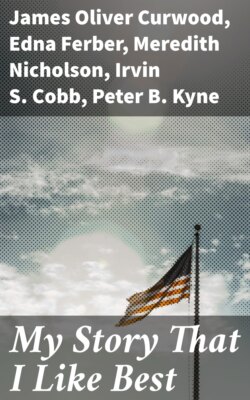Читать книгу My Story That I Like Best - Peter B. Kyne - Страница 4
На сайте Литреса книга снята с продажи.
FOREWORD
ОглавлениеMost writers lie about the way in which they came to write this or that story. I know I do. Perhaps, though, this act can't quite be classified as lying. It is not deliberate falsifying. Usually we roll a retrospective eye while weaving a fantastic confession that we actually believe to be true. It is much as when a girl says to her sweetheart, "When did you begin to love me?" and he replies, "Oh, it was the very first time I saw you, when——" etc. Which probably isn't true at all. But he thinks it is, and she wants to think it is. And that makes it almost true.
It is almost impossible to tell just how a story was born. The process is such an intricate, painful, and complicated one. Often the idea that makes up a story is only a nucleus. The finished story may represent an accumulation of years. It was so in the case of the short story entitled "The Gay Old Dog."
I like "The Gay Old Dog" better than any other short story I've written (though I've a weakness for "Old Man Minick") because it is a human story without being a sentimental one; because it presents a picture of everyday American family life; because its characters are of the type known as commonplace, and I find the commonplace infinitely more romantic and fascinating than the bizarre, the spectacular, the rich, or the poor; it is a story about a man's life, and I like to write about men; because it is a steadily progressive thing; because its ending is inevitable.
It seems to me that I first thought of this character as short-story material (and my short stories are almost invariably founded on character, rather than on plot or situation) when I read in a Chicago newspaper that the old Windsor Hotel, a landmark, was to be torn down. The newspaper carried what is known as a feature story about this. The article told of a rather sporty old Chicago bachelor who had lived at this hotel for years. Its red plush interior represented home for him. Now he was to be turned out of his hotel refuge. The papers called him The Waif of the Loop. That part of Chicago's downtown which is encircled by the elevated tracks is known as the Loop. I thought, idly, that here was short-story material; the story of this middle-aged, well-to-do rounder whose only home was a hotel. Why had he lived there all these years? Was he happy? Why hadn't he married? I put it down in my note-book (yes, we have them)—The Waif of the Loop. Later I discarded that title as being too cumbersome and too difficult to grasp. Non-Chicagoans wouldn't know what the Loop meant.
So there it was in my note-book. A year or two went by. In all I think that story must have lain in my mind for five years before I actually wrote it. That usually is the way with a short story that is rich, deep, and true. The maturing process is slow. It ripens in the mind. In such cases the actual mechanical matter of writing is a brief business. It plumps into the hand like a juicy peach that has hung, all golden and luscious, on the tree in the sun.
From time to time I found myself setting down odd fragments related vaguely to this character. I noticed these overfed, gay-dog men of middle age whom one sees in restaurants, at the theater, accompanied, usually, by a woman younger than they—a hard, artificial expensively gowned woman who wears a diamond bracelet so glittering that you scarcely notice the absence of ornament on the third finger of the left hand. Bits of characterization went into the note-book . . . "The kind of man who knows head waiters by name . . . the kind of man who insists on mixing his own salad dressing . . . he was always present on first nights, third row, aisle, right." I watched them. They were lonely, ponderous, pathetic, generous, wistful, drifting.
Why hadn't he married? Why hadn't he married? It's always interesting to know why people have missed such an almost universal experience as marriage. Well, he had had duties, responsibilities. Um-m-m—a mother, perhaps, and sisters. Unmarried sisters to support. The thing to do then was to ferret out some business that began to decline in about 1896 and that kept going steadily downhill. A business of the sort to pinch Jo's household and make the upkeep of two families impossible for him. It must, too, be a business that would boom suddenly, because of the War, when Jo was a middle-aged man. I heard of a man made suddenly rich in 1914 when there came a world-wide demand for leather—leather for harnesses, straps, men's wrist watches. Slowly, bit by bit, the story began to set—to solidify—to take shape.
Finally, that happened which always reassures me and makes me happy and confident. The last paragraph of the story came to me, complete. I set down that last paragraph, in lead pencil, before the first line of the story was written. That ending literally wrote itself. I had no power over it. People have said to me: "Why didn't you make Emily a widow when they met after years of separation? Then they could have married."
The thing simply hadn't written itself that way. It was unchangeable. The end of the story and the beginning both were by now inevitable. I knew then that no matter what happened in the middle, that story would be—perhaps not a pleasant story, nor a happy one, though it might contain humor—but a story honest, truthful, courageous and human.
